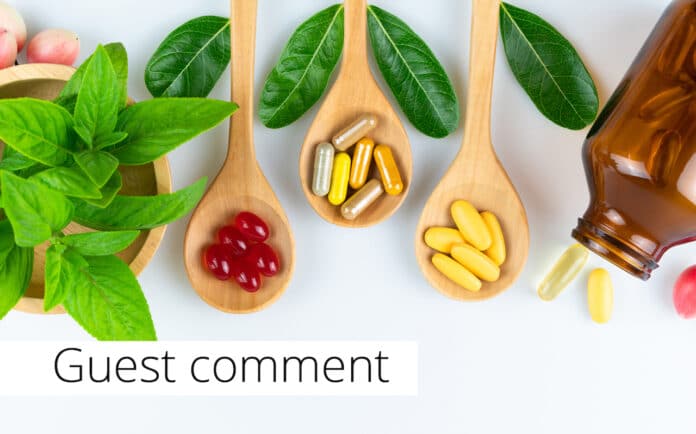Adrian Whitefoord, co-founder of Pemberton & Whitefoord Design Consultants, analyzes the key natural category drivers and looks at how the psychological impact of COVID-19 has helped to drive growth in the vitamins, minerals and supplements category
I admit, historically, I have been pretty unscientific in my utilization of health supplements. However, when the NHS touted vitamin D as efficacious as a natural defence against COVID-19 early in the pandemic, I jumped on the bandwagon. And since, I’ve readjusted my perspective on vitamins, minerals and supplements.
Like many, my awareness of the benefits of taking VMS products as a preventative measure in helping maintain the function of my body’s natural defences has increased. Unfortunately, many people have also suffered psychologically recently, resulting in more consumers seeking a means of improving their mental wellbeing. In fact, Kantar has reported that in the UK, growth in the VMS sector is being driven by almost 2.8 million more health-aware consumers purchasing into the category. And now, the VMS industry is worth a staggering £500 million in Britain alone, expected to increase another £59 million within four years.
Vitamin D has proven the fastest-growing product in percentage terms since the COVID-19 outbreak – an extra 3.8 million packs were sold (up by 103% to £27.7 million). The biggest winner in the UK has been adult multivitamins, which have dominated sales; they’re now worth £160.2 million (increasing by £36.4 million).
However, vitamin aisles remain overwhelming. From character-shaped gummies to turmeric capsules, hair supplements to vitamin oral sprays, the VMS category is wide and varied. Understandably, many consumers find it confusing, so what can retailers do to provide clarity, and what does the future look like for the category?
Personalized options
Personalized supplementation will be a key driver. Boots offers an online question-based service, similar to Get Nourished and Vitamin Buddy. Within five minutes, you have a list of Boots-branded products tailored to your specific needs. VMS subscription services like Holland & Barrett’s Healthbox are likely to be fulfilled by more retailers over the coming months, and I’d go as far as to predict that personal nutritionists (automated online or physical in-store) will become tomorrow’s personal trainers.
Mental health
Alarmingly, among other psychological issues, many Brits have recently experienced increased levels of loneliness, depression and suicidal behaviours. As a result, a proliferation of natural supplements that support mental health is expected. This includes products specifically marketed to help improve sleep and mood. From supplements containing lion’s mane mushroom (for growth and regeneration of neurons) to £200 premium supplement starter packs containing ‘affron’ (a saffron extract), there are pioneering natural ingredients claiming to increase mental resilience, and consumers’ interest is piqued. Attentive retailers will be evolving their online and in-store offerings to include natural mood-enhancing and brain function-supporting products.
Dietary aids
With the UK Government pushing its anti-obesity drive, more people are turning to natural weight-loss supplements. Shrewd retailers will provide natural dietary aids that help increase energy, burn calories and curb hunger pangs. Whilst there is no ‘magic pill’ to melt off fat, some natural products can make noticeable improvements in weight loss and body fat percentage. Natural probiotics (live microorganisms that line digestive tracts) available in supplement form will become more commonplace and a rise in pill-based protein products is expected as consumers look to a more palatable alternative to powders.
Collagen
Taking collagen supplements can have a variety of health benefits, including improving skin health and relieving joint pain. Some brands make bold claims about improved skin texture and wrinkle reduction, and collagen is also a hot topic in the sports supplements category, supporting the repair of muscles, boosting muscle mass and helping prevent bone loss. Although collagen products are already available at many retailers, it’s expected they will tap into the growing trend by launching specialist own-brand marine or bovine collagen peptide products specifically targeted at gym and sports enthusiasts, and 100% vegan collagen products, made using genetically-modified yeast and bacteria, catering to the rising plant-powered movement.
As for me, I’ll be continuing with my revised supplement regime and look forward to reviewing VMS retail offerings a year from now. I believe the VMS retail landscape will have evolved significantly, with many more natural products orientated towards supporting mental health and diet as well as personalised solutions for consumers and innovations in collagen.











